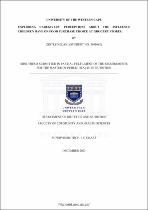| dc.contributor.advisor | Swart, Rina Elizabeth Catherina | |
| dc.contributor.author | Nelani, Zintle | |
| dc.date.accessioned | 2024-04-10T09:02:17Z | |
| dc.date.available | 2024-04-10T09:02:17Z | |
| dc.date.issued | 2024 | |
| dc.identifier.uri | http://hdl.handle.net/11394/10727 | |
| dc.description | Magister Public Health - MPH | en_US |
| dc.description.abstract | Background: There is a rising global problem of diet-related non-communicable diseases (NCDs) such as overweight and obesity. The evidence shows a positive association between the marketing of foods and beverages high in fat, sugar, and/or salt (HFSS) to children and the increasing obesity trends, a phenomenon known as commercial determinant of health. Evidence also shows that marketing power and children's eating behaviour, preference, requests, nutrition knowledge, and food intake are linked. | en_US |
| dc.language.iso | en | en_US |
| dc.publisher | University of the Western Cape | en_US |
| dc.subject | South Africa | en_US |
| dc.subject | Child obesity | en_US |
| dc.subject | Child nutrition | en_US |
| dc.subject | Food choices | en_US |
| dc.subject | Child-directed marketing | en_US |
| dc.title | Exploring caregivers’ perceptions about the influence children have on food purchase choice at grocery stores. | en_US |
| dc.rights.holder | University of the Western Cape | en_US |

